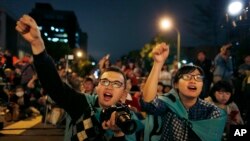Taiwan’s president has made history by ending decades of icy relations with China and signing a series of economic agreements with Beijing. But many Taiwanese say the deals with China have not seen benefits trickle down to common people and could threaten the proudly self-ruled island.
As Taiwan President Ma Ying-jeou begins his final year in office, Taiwanese are weighing the pros and cons of his ambitious policy of engaging China to shore up the economy at home. Taiwan and China have been separately ruled since the Chinese civil war of the 1940s, but China still claims sovereignty over the island. After taking office in 2008, President Ma set aside political differences to work with Beijing on trade, tourism and investment agreements.
Now much of the island’s public is reexamining those deals as economic issues persist. Huang Kwei-bo, associate professor of diplomacy at National Chengchi University in Taipei, said the public wants more dialogue with China but has not accepted the risks.
He said most mainstream opinion still hopes for continued negotiations across the Taiwan Strait, no matter who is president in the future. But Huang added that people in Taiwan hope the president will safeguard Taiwan's interests as well as its safety, preserving Taiwan's autonomy. He said these two goals can be hard to realize at the same time.
When Ma campaigned for president in 2008, he pledged economic growth of 6 percent, unemployment at less than 3 percent and per capita income of more than $30,000 per year. The deals reached with China since he took office have sent two-way trade to record highs and sent Taiwan 2.8 million mainland Chinese tourists last year, up from just a trickle before. Ma said last year the pacts had also created a combined 9,600 jobs. Previous Taiwanese presidents clashed with China, making most dialogue impossible.
But government figures show that the original pledges have fallen short. Economic growth was just 3.74 percent last year and unemployment is closer to 4 percent. Average per capita income is around half the pledged goal. Ordinary Taiwanese complain of low wages and high property prices.
Huang Chun-jung, a leader in the 30-member advocacy group Taiwan Youth Public Affairs, said gains from deals with China have been illusory. Youth groups led tens of thousands in Taipei protests in March and April last year because they saw few economic benefits, but worried the communist leadership would use the agreements to push Taiwan toward political unification. The protests blocked parliament from ratifying a service trade liberalization agreement with Beijing.
He said the policies being pursued now totally help big companies, but there's no chance the companies will share proceeds with their employees. Therefore he thinks this kind of reliance on cross-Strait relations to help Taiwan's economy is a very silly idea.
Taiwanese also grumble about the soaring numbers of mainland Chinese tourists. At a beach in the southern city Kaohsiung, some locals installed a fake cannon last month to protest congestion by mainland Chinese tour group buses and litter left behind. Merchants complain that the tourists bargain too hard on small-value purchases.
Taiwanese officials say the global financial crisis seven years ago has hindered the president in realizing his economic pledges. They argue that ties with China have helped Taiwan's half-trillion-dollar economy. Lin Chu-chia, deputy minister of Taiwan's China policymaking body, the Mainland Affairs Council, said 71 percent of Taiwanese want to sustain official communication with China with a view toward more economic agreements.
“Even though if you want to have Taiwan independence, it also means you like to have official contact with each other. Both sides should accept both sides are official governments. I think the major problem is not from China, it's because of the financial tsunami at the end of 2008 and beginning of 2009,” said Lin.
President Ma's Nationalist Party faces tough elections in January partly due to the conflicting views on engagement with China. The chief opposition candidate, Tsai Ing-wen, said she wants to keep talking with Chinese leaders, but disputes Beijing's precondition that both sides negotiate as part of a single country. Ma, who accepts Beijing's requirement, has said economic dialogue with China will continue until he steps down due to term limits next year.
